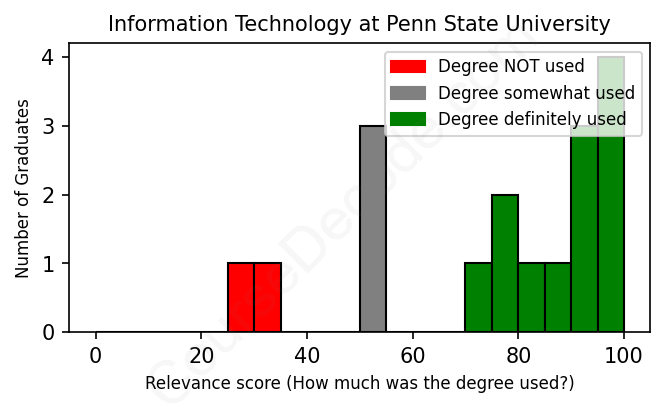
First, some facts. Of the Information Technology graduates from Penn State University we've analyzed , here's how many have used (or NOT used) their degree in their career:

These are estimates based on AI analysis of 17 LinkedIn profiles (see below).
The verdict? Above average. Overall, with an average relevance score of 75%, Information Technology graduates from Penn State University have a higher likelihood (+8%) of finding work in this field compared to the average graduate across all fields:
And for comparison, here's the chart for all profiles we've looked at across all degrees.
Also, after graduating, only 11% of these graduates have pursued further education other than another Bachelor's degree (such as a Masters degree or other), compared to the average across all profiles of 35%. This suggests a Bachelors degree is enough for most Information Technology graduates, and it's normal to look for work straight after graduation.
See the details:
|
Relevance score: 54% We think this person has gone into a career only somewhat relevant to their degree. We think this person has gone into a career only somewhat relevant to their degree.
DEGREE INFOGraduated in 2019 from Penn State University with a Bachelor's degree in Information Technology. No other secondary education since. JOB HISTORY SINCE GRADUATIONService Analyst II PPG Jul 2019 - Nov 2021 Product Information Management Specialist  PPG Nov 2021 - Jun 2024 Senior Product Data Specialist  PPG Jun 2024 - Present ABOUTCurrently the CIO of UnisBrands and a Product Information Management Specialist for PPG Industries Inc. I have a passion for all things IT related and I graduated from The Pennsylvania State University with a B.S. in Information Sciences and Technology |
The top 10 most common jobs done by the graduates we've analyzed (ranked most common to least) are:
When looking at job positions held by graduates of the Information Technology program at Penn State University, there is a noticeable mix of roles that are directly related to IT and others that aren’t as much. Many graduates have taken on typical IT roles like Software Engineer, Information Security Engineer, and System Administrator positions, which heavily rely on the skills and technical knowledge gained through their degree. Roles like these are super relevant and directly apply what students learn about programming, system designs, and security practices. For instance, the Software Engineer position and various system administrator roles involve significant daily use of IT skills, showcasing how these degrees lead directly to tech-centric careers.
However, there’s also a sizable number of graduates who have landed jobs that don’t fully utilize their IT training. Many have ventured into roles like Pricing Analyst or Marketing Specialist, which focus more on strategy or customer service rather than technological expertise. Although some of these positions might incorporate IT skills to a degree—like data analysis or using specific software—it's clear that they aren’t leveraging the full scope of what an Information Technology degree can prepare someone for. Overall, while many graduates have found relevant IT jobs, a good chunk have ended up in roles that only tangentially connect to their major, showing that the job market can be quite varied regardless of one’s specialization in technology.
Here is a visual representation of the most common words in job titles for Information Technology graduates (this is across all Information Technology graduates we've analyzed, not just those who went to Penn State University):

Graduates from Penn State University's Information Technology program tend to start their careers in entry-level positions that are quite relevant to the field. Common first jobs include roles like software engineers, technical support, and data analysts. For example, graduates from 2010 and 2011 found themselves as software engineers or data specialists shortly after graduation, quickly working their way up within their respective companies. It's clear that many of these graduates are able to secure jobs that align well with their degree, leading to promising first steps in their professional lives.
As they progress five to ten years after graduation, many alumni seem to have grown into more advanced roles, such as senior managers and specialized engineers. This is evident in the profiles where individuals have moved from technical positions to more strategic leadership roles or specialized areas like information security and systems administration. However, a few graduates ventured into unrelated fields, like real estate or customer service, showcasing that not everyone stays strictly in the tech lane. Overall, it looks like a solid percentage of Penn State IT graduates find good opportunities in their field and continue to advance their careers over the years, reflecting a positive trajectory for many. It's definitely a good sign if you're considering a career in IT from Penn State!
The Bachelor’s degree in Information Technology at Penn State University, like many tech programs, can be a mixed bag in terms of difficulty. It’s not impossible, but it definitely has its challenging moments. You’ll dive into a lot of technical subjects, coding, and problem-solving, which might feel pretty intense if you're not already comfortable with that kind of stuff. However, if you enjoy tech and are willing to put in the effort, many students find it manageable and even rewarding. Overall, it tends to be a bit more demanding than some other majors, but with the right mindset and study habits, you can definitely handle it!
Most commonly, in the LinkedIn profiles we've looked at, it takes people 4 years to finish a Bachelor degree in Information Technology.
Looking at these Penn State IT grads, it seems like they’ve mostly landed solid gigs that could translate into decent money. The older grads, especially those in roles like Software Engineer or Pricing Analytics Manager, are likely pulling in some good salaries, as those positions usually come with pretty sweet paychecks. The ones who graduated more recently might still be on the lower end of the pay scale since they’re starting out or working in more entry-level roles, but many are quickly moving into higher-paying jobs like Systems Administrator or IT Specialist. Overall, it looks like a good chunk of these folks are positioning themselves well in the job market, which bodes well for their future earnings.
Here is a visual representation of the most common words seen in the "about" section of LinkedIn profiles who have a Bachelor degree in Information Technology (this is across all Information Technology graduates we've analyzed, not just those who went to Penn State University). This may or may not be useful:

Here are all colleges offering a Bachelor degree in Information Technology (ordered by the average relevance score of their Information Technology graduates, best to worst) where we have analyzed at least 10 of their graduates: